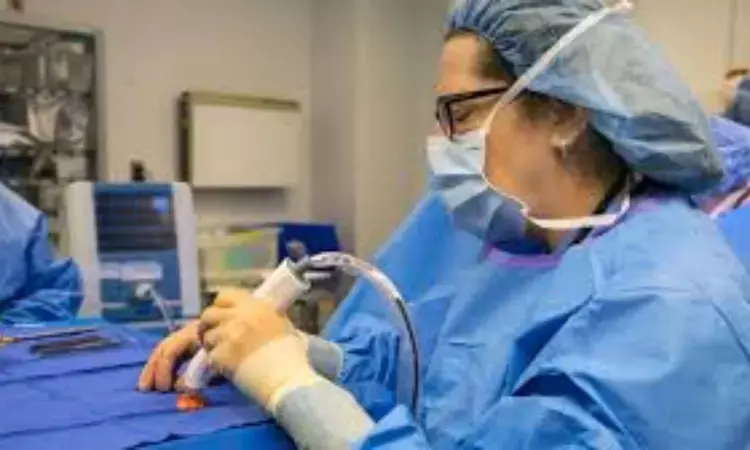- Home
- Medical news & Guidelines
- Anesthesiology
- Cardiology and CTVS
- Critical Care
- Dentistry
- Dermatology
- Diabetes and Endocrinology
- ENT
- Gastroenterology
- Medicine
- Nephrology
- Neurology
- Obstretics-Gynaecology
- Oncology
- Ophthalmology
- Orthopaedics
- Pediatrics-Neonatology
- Psychiatry
- Pulmonology
- Radiology
- Surgery
- Urology
- Laboratory Medicine
- Diet
- Nursing
- Paramedical
- Physiotherapy
- Health news
- Fact Check
- Bone Health Fact Check
- Brain Health Fact Check
- Cancer Related Fact Check
- Child Care Fact Check
- Dental and oral health fact check
- Diabetes and metabolic health fact check
- Diet and Nutrition Fact Check
- Eye and ENT Care Fact Check
- Fitness fact check
- Gut health fact check
- Heart health fact check
- Kidney health fact check
- Medical education fact check
- Men's health fact check
- Respiratory fact check
- Skin and hair care fact check
- Vaccine and Immunization fact check
- Women's health fact check
- AYUSH
- State News
- Andaman and Nicobar Islands
- Andhra Pradesh
- Arunachal Pradesh
- Assam
- Bihar
- Chandigarh
- Chattisgarh
- Dadra and Nagar Haveli
- Daman and Diu
- Delhi
- Goa
- Gujarat
- Haryana
- Himachal Pradesh
- Jammu & Kashmir
- Jharkhand
- Karnataka
- Kerala
- Ladakh
- Lakshadweep
- Madhya Pradesh
- Maharashtra
- Manipur
- Meghalaya
- Mizoram
- Nagaland
- Odisha
- Puducherry
- Punjab
- Rajasthan
- Sikkim
- Tamil Nadu
- Telangana
- Tripura
- Uttar Pradesh
- Uttrakhand
- West Bengal
- Medical Education
- Industry
Is micro-CT effective for assessing tumour margins during breast-conserving surgery?

USA: A recent study published in Annals of Surgical Oncology revealed that micro-CT (computed tomography) is promising as an additional tool to standard-of-care evaluation of tumour margins during breast-conserving surgery.
The researchers wrote, "Micro-CT identified the same proportion of margin-positive cases as standard specimen radiography and palpation, but due to difficulty differentiating between cancer and radiodense fibro glandular tissue, resulted in a higher proportion of false positive margin assessments."
Breast-conserving surgery (BCS) is an essential early-stage breast cancer treatment component. However, costly re-excision procedures are frequent due to the high prevalence of cancer-positive margins on primary resections. Standard-of-care assessment of breast tumour specimens comprises visual examination and radiography plus palpation. Still, this approach can be limited by overlapping radiodensities of tumour and breast tissues that tend to obscure lesion borders. Therefore, there is a need to develop and evaluate improved methods of margin assessment for the intraoperative detection of positive margins.
"The success of breast-conserving surgery is based on the ability of the surgical team to evaluate resection margins thoroughly and rapidly during the initial procedure to avoid costly re-excision procedures associated with worse cosmetic outcomes, increased patient distress, and increased medical costs," the team wrote.
For this purpose, Samuel S. Streeter, Dartmouth College, Hanover, NH, USA, and colleagues conducted a prospective trial through which micro-CT with radiological interpretation was evaluated by three independent readers for BCS margin assessment. Findings were compared to standard-of-care intraoperative margin assessment (i.e., SIA (specimen palpation and radiography) for cancer-positive margins detection.
The authors reported the following findings:
- Six hundred margins were analyzed from 100 patients. Twenty-one margins in 14 patients were pathologically positive.
- On analysis at the specimen level, SIA yielded a sensitivity, specificity, positive predictive value (PPV), and negative predictive value (NPV) of 42.9%, 76.7%, 23.1%, and 89.2%, respectively.
- SIA correctly identified six of 14 margin-positive cases with a 23.5% false positive rate (FPR).
- Micro-CT readers achieved sensitivity, specificity, PPV, and NPV ranges of 35.7–50.0%, 55.8–68.6%, 15.6–15.8%, and 86.8–87.3%, respectively.
- Micro-CT readers correctly identified five to seven of 14 margin-positive cases with an FPR range of 31.4–44.2%.
- If micro-CT scanning had been combined with SIA, up to three additional margin-positive specimens would have been identified.
"There is a need for additional studies to capture better the effectiveness of micro-CT scanning for intraoperative margin assessment burning BCS," the authors conclude. "The focus o these studies should be reporting institutional standard-of-care techniques for intraoperative margin assessment, along with details related to duration allowed for image interpretation, how and when radiological interpretation is performed, and the quality of micro-CT scanning to understand better and characterize the differences between published breast-conserving surgery specimen datasets and reported margin assessment performances."
Reference:
Streeter, S.S., Zuurbier, R.A., diFlorio-Alexander, R.M. et al. Breast-Conserving Surgery Margin Guidance Using Micro-Computed Tomography: Challenges When Imaging Radiodense Resection Specimens. Ann Surg Oncol (2023). https://doi.org/10.1245/s10434-023-13364-z
Dr Kamal Kant Kohli-MBBS, DTCD- a chest specialist with more than 30 years of practice and a flair for writing clinical articles, Dr Kamal Kant Kohli joined Medical Dialogues as a Chief Editor of Medical News. Besides writing articles, as an editor, he proofreads and verifies all the medical content published on Medical Dialogues including those coming from journals, studies,medical conferences,guidelines etc. Email: drkohli@medicaldialogues.in. Contact no. 011-43720751


